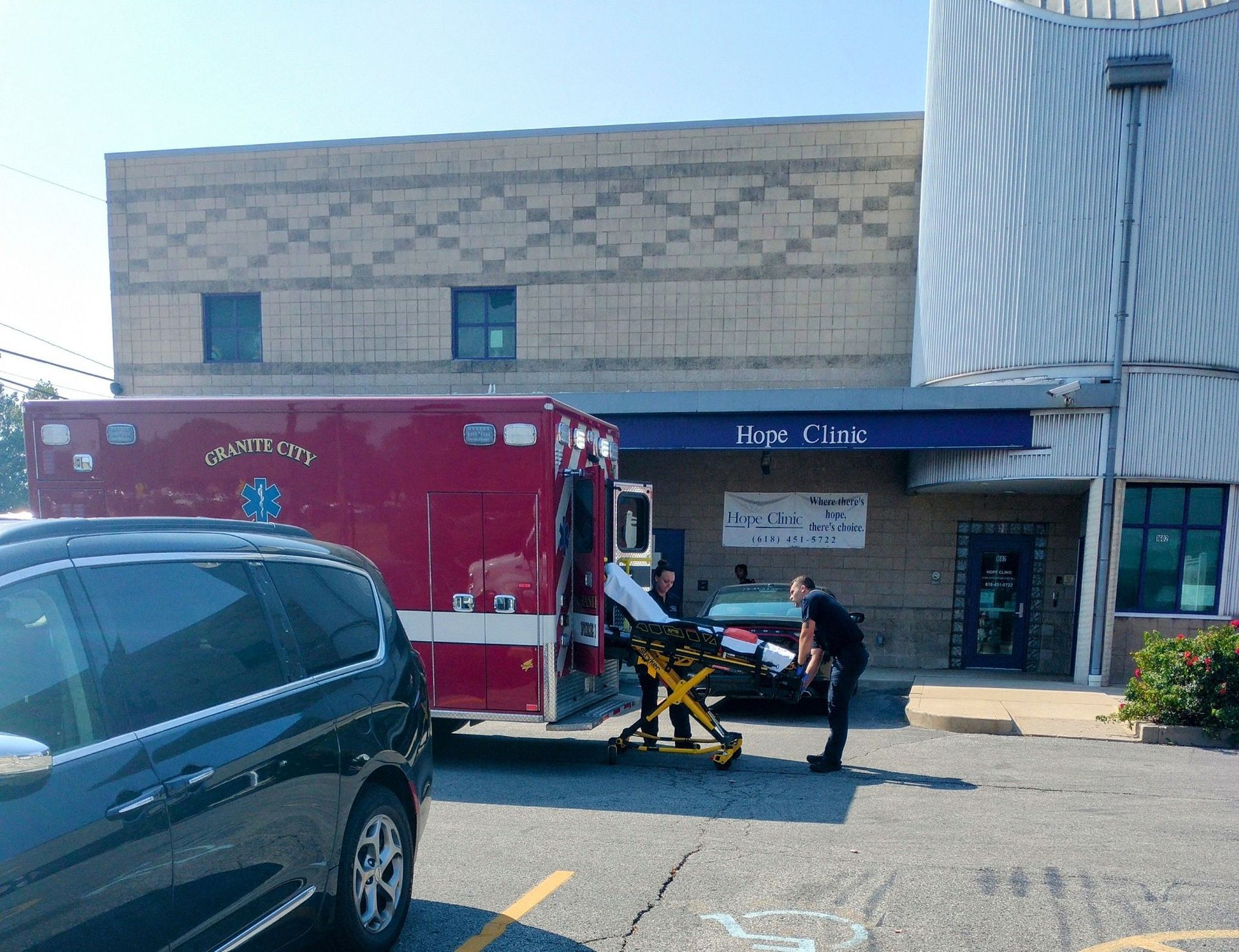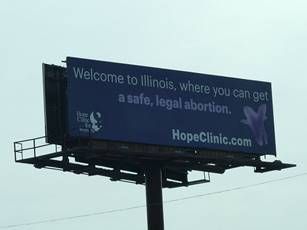ABORTION, Unregulated, Unsafe, and Underreported
Illinois abortion facilities make former Iraqi torture rooms look like a “spa”.
June 17, 2011
Is anyone surprised? Fortunately, the Chicago Tribune wrote this investigative piece below that is a long time overdue. Now, are the Health Department and its regulators going to do their job protecting women by investigating these slaughterhouses? Our 19 year ministry has reported and documented this travesty for years outside the Midwest’s largest, late-term abortion mill:
Hope Clinic, in Granite City, Illinois where no parental consent is necessary and they specialize in late-term terminations. How many women need to be brought butchered and maimed to emergency rooms where the ‘code of silence’ continues? Read through articles on our website confirming the reality that back alley abortion has not ended…it just costs more and the abortionist comes through the front door. The marquee outside the Hope abortion mill should read:
“Kill Your Baby At Your Own Risk.” ~Angela Michael
www.smallvictoriesus.com articles
Hope Clinic Taken to the Cleaners July 2007
Granite City’s Little House of Horrors March 2008
Granite City's Slaughterhouse Sued Again! May 2008
Woman Found in Pool of Blood July 2008
DO YOU CARE? Hope Clinic Slaughterhouse Butchers Arkansas Girl January 2009
Another Young Girl Butchered in the City of Slaughter February 2009
Granite City ’s Baby-Butcher Hit with Two More Lawsuits August 2009
www.chicagotribune.com/health/ct-met-abortion-reporting-20110615,0,746323.story
chicagotribune.com
State abortion records full of gaps
Thousands of procedures not reported to health department
By Megan Twohey, Tribune reporter
3:24 PM CDT, June 16, 2011
Health care providers are failing to detail abortion complications to the state as required by law, one of many gaps in a surveillance system viewed as crucial to protecting patients, a Tribune review has found.
The state's system for tracking abortions is so broken that regulators also may be missing more than 7,000 of the procedures per year.
The Illinois Department of Public Health must collect details about every abortion performed in the state, including whether the patient is injured or dies.
The mandatory reporting is essential for tracking trends in public health and can provide a window into quality of care. While abortion has proven to be a very safe procedure, heightened rates of complications or clusters of deaths could signal problems with particular providers.
"If people are looking at reports and seeing excessive complications, that might warrant another look or another inspection," said Vicki Saporta, president of the National Abortion Federation, an association of providers.
But there are significant holes in state monitoring of a procedure that affects tens of thousands of Illinois women each year. Nationally, current rates suggest that nearly 1 in 3 women will have an abortion, according to research published in the medical journal Obstetrics & Gynecology.
The Tribune found:
•State regulators have documented between 7,000 and 17,000 fewer abortions a year than a national research group found in Illinois.
•This reporting is the only tool Illinois authorities have to monitor some abortion providers, yet regulators may be allowing doctors and clinics to operate off the books. Regulators collect reports from 26 providers, but the abortion rights research group has identified 37 providers doing business in the state.
•Also unknown to officials are the types of abortion-related problems experienced by women. Nearly 4,000 reports of abortion complications involving Illinois residents in 2009 were missing the required description.
•Health care providers who intentionally fail to submit accurate and complete reports are committing a criminal act, and a failure to report abortion complications is grounds for revoking their licenses, but the Department of Public Health has never sought disciplinary action against a provider.
Kelly Jakubek, an agency spokeswoman, said in a written response that it was the responsibility of abortion doctors to ensure they comply with the mandatory reporting requirement.
Regulators don't respond to the reports in any way, she said, because they view the information as serving statistical purposes only.
"It's outrageous," declared Maurice Stevenson, whose wife died in 2002 from infection following an abortion at a Planned Parenthood clinic in Chicago. "These procedures, complications and deaths should be public record."
Critics contend that accurate government accounting is essential, especially with a politically charged issue such as abortion in which both sides push information to further their agendas.
A review of malpractice cases revealed other abortion-related complications in Illinois — with no way of knowing whether they were reported to the state.
For example, in 2002, after an area woman's uterus was torn in an abortion she began hemorrhaging, went into cardiac shock and was hospitalized for three weeks. Several years later, a mother of three experienced seizure symptoms and slipped into a coma following her abortion at a city clinic. And in 2009, a teenage girl suffered respiratory and cardiac arrest and died immediately following her abortion in a northern suburb, according to court records.
The state Legislature included mandatory reporting in the 1975 Illinois Abortion Law, a compilation of guidelines enacted after the U.S. Supreme Court decision in Roe v. Wade.
Abortion providers succeeded in stripping away many of the law's other requirements, but a 1993 legal settlement between providers and the state retained mandatory reporting "to better protect the health of women undergoing these procedures."
Why does the information matter?
The confidential reports are "very important from both a demographic and public health viewpoint," according to the federal Centers for Disease Control and Prevention, which surveys abortion data collected by the states.
In addition to illuminating trends in unplanned pregnancies and documenting access to abortion, the reports have helped to reveal that certain procedures carry higher risks of complications and that dangers increase exponentially as the pregnancy progresses.
In Illinois, reporting also provides an opportunity to monitor all doctors who perform abortions. Not all abortion providers are licensed as such. The Department of Public Health has licensed 14 providers as ambulatory surgical treatment or pregnancy termination specialty centers.
But licensing is different in other settings where abortions are performed, including at clinics where surgeries account for less than 50 percent of their business and at private physicians offices.
It is unclear which providers are making reports.
The New York-based Guttmacher Institute, an abortion rights research organization, conducts its own accounting across the country. Its information is widely viewed as more accurate than what is collected by state regulators because the organization makes extensive efforts to identify abortion doctors and follow up with them.
It was Guttmacher that located 37 providers in Illinois in 2008, and it is Guttmacher that has consistently counted thousands more abortions per year than the number recorded by state regulators.
A Tribune examination of the reporting data collected by the state revealed missing information.
Providers often did not specify, as required, whether a complication was a tear of the uterus or another specific problem.
In certain medical malpractice cases reviewed by the Tribune, women said they were never informed by their provider that the abortion was unsuccessful and later underwent challenging pregnancies, painful deliveries and other complications.
Others suffered anesthesia-related problems, hemorrhaging and infections, according to the suits.
The federal government also identified gaps in Illinois' abortion surveillance system, saying that more than 15 percent of reports in 2007 did not specify how far along pregnancies were and what type of procedure was used.
Jakubek said the numbers of abortion providers documented by Illinois regulators and Guttmacher are different because they use different counting methods. The research organization's tally includes hospitals, clinics and physicians' offices. Jakubek said the 26 providers identified by state regulators "only includes facilities," but declined to elaborate on her definition of facility.
The problem of underreporting isn't limited to abortion, said John Lumpkin, who left the Department of Public Health in 2003 after serving as director for 12 years. But the agency lacks the funds to address it, he said.
"Whether it's flu, food poisoning or pregnancy termination, we knew there was underreporting going on," said Lumpkin, who now directs the Robert Wood Johnson Foundation's Health Care Group. "The health department doesn't have the resources to follow up with every doctor's office that is reporting food poisoning or flu, nor did it have resources to follow up with every provider of pregnancy termination."
Stanley Henshaw, a Guttmacher researcher, has explored abortion reporting problems and "lax enforcement" across the country.
Some providers feared that reports would fall into the hands of anti-abortion protesters or competitors, even though breaches of confidentiality are rare.
Today, Henshaw theorizes it is the shoddiest operators who are not reporting the abortions they perform. Either they refuse to comply or are so off the radar they are unaware of the requirement.
"I think it's only a problem with the worst providers," said Henshaw, who has recommended audits of state abortion reports, a process that would involve verifying who all the providers are.
As safe as abortion is, dangerous providers do exist, made evident by the murder charges filed this year against a Philadelphia abortion doctor whom prosecutors accused of operating a "house of horrors."
Some providers identified by the Tribune refused to discuss reporting.
Others, such as Planned Parenthood and Family Planning Associates, said they were diligent about complying and concerned if others were not.
"It is useful public health information. … We'd hope all providers would comply," said Carole Brite, president of Planned Parenthood of Illinois.
At the same time, Planned Parenthood could not confirm for the Tribune whether it had reported the 2002 death of Stevenson's wife, only that it had reported the 2008 death of another patient. The organization said it had no reason to believe the 2002 death was not reported but that the records were in storage.
And Family Planning Associates said it could not confirm whether it had reported three deaths, in 1998, 1999 and 2000.
A woman who identified herself as a manager of the Women's Aid Clinic of Lincolnwood would not comment on a 2009 death.
The Tribune identified these deaths as part of its review of malpractice suits.
Providers are required to report all abortion-related deaths to the state, not just those in which the death was directly caused by abortion or those involving wrongdoing on the part of health care workers.
In states with more complete reporting, officials have taken active steps to identify providers and follow up with them.
In Minnesota, doctors are informed of the reporting requirement when they are licensed. And state officials send annual reminders to every physician and press those who submit incomplete forms, said Carol Hajicek of the Minnesota Department of Health, which sends a lengthy report on abortion data to the Legislature each year.
"We think we're getting them all," Hajicek said.
Copyright © 2011, Chicago Tribune











